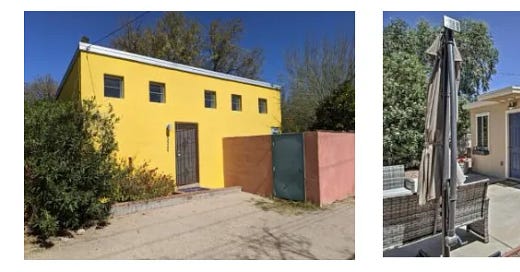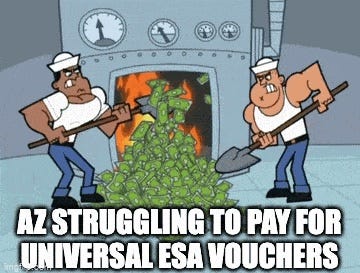The Daily Agenda: Casitas in Tucson still a work in progress
The public can vote on casita designs ... But casitas ain't cheap ... Tucson signs water-sharing agreement.
There are just two days left to cash in on the Children’s Museum of Tucson’s summer sale for its October fundraising gala, Evening of Play. The museum is a nonprofit that provides hands-on, fun, educational opportunities to thousands of kids in our community each year. Get your tickets now before they increase in price on Sept. 1.
Click on the image above to learn more or purchase tickets.
And if you’d like to get the word out about your business, event or organization, we have good news! The Tucson Agenda and Arizona Agenda are opening up sponsorship/advertising opportunities. Click on the button to get in touch.
While you don’t have much say in what kind of house your neighbor builds, you do get to have a little input in what kind of casita they build.
That’s because the City of Tucson is hosting a casita design competition and you’ll get to vote on which designs win. (Staff from the Planning and Development Services Department will review submissions, too, so we don’t end up with the housing equivalent of R.S.S. Boaty McBoatface.)
The 10 winning designs will become pre-approved Casita Model Plans and the city will waive building review fees when residents use them to build.
The Tucson City Council was ahead of the curve in backing regulations to allow backyard casitas citywide in December 2021 as a way to combat the housing crisis. Lawmakers took up the idea of forcing cities to allow for casitas — also called “accessory dwelling units” — as part of a failed affordable housing package this year, and the Phoenix City Council is currently attempting to follow Tucson’s example by reforming its zoning laws to allow more casitas as a way to combat the affordable housing crisis.
But casitas aren’t exactly cheap to build. The 10 people who listed the cost of their planned casitas when they responded to a city survey earlier this year put it at $140,000 to $200,000. At that price, you might as well build a whole house, not just a casita.
The cost is likely a big reason why the city received just 61 applications to build casitas in all of 2022.

So city officials set about finding ways to chip away at the cost, such as waiving the requirement for separate utility hookups. They also waived some of the green requirements, such as electric-vehicle charging, if a casita is attached to a house or converted from a garage. In March, the city council asked staff to come up with a way to waive the $2,750 impact fees required for casitas.
The design competition is another way city officials are trying to make casitas more affordable.
It’s also a chance for Tucson’s creative richness to shape how the city will look for years to come, and promises a $1,000 check for each of the 10 winners.
We don’t have any design skills, so that $1,000 is out of reach for us. But we do have wonderful readers who keep us in business by paying for subscriptions.
The city will accept design submissions until Sept. 18 and city staff will give feedback to designers at an open house on Sept. 7.
City staff held an information session this month to lay out some guidelines around accessibility, privacy, and whether the design will fit with a variety of architectural styles. Other guidelines focus on drainage, stormwater management, passive heating and cooling, along with minimizing labor costs and using readily available materials.
After designs are submitted, the city will run a public survey from Oct. 1-22. This is your moment to weigh in on what type of casitas you want to see popping up around town.
Winners will be announced in November. Maybe then the long-overdue promise of casitas helping with the housing crisis will start bearing some fruit.
Getting their day in court: Conservation groups that filed a lawsuit against a pair of mining projects slated for the Patagonia Mountains will appear in court in Tucson Thursday afternoon, KJZZ Fronteras Desk’s Alisa Reznick writes. The groups say the area in question is a vital habitat for endangered species and important source of groundwater. The suit alleges that the U.S. Forest Service violated the National Environmental Protection Act when it granted permission for the projects to proceed.
Banking resources for the future: Tucson has entered into a water-sharing agreement with Peoria, Scottsdale and Gilbert to store, recover and exchange Central Arizona Project water. The communities will store a portion of their CAP water allocation in Tucson’s Southern Avra Valley Storage and Recovery Project facility and in times of shortage — which could trigger cuts on CAP water allocations — could retrieve a portion of Tucson’s CAP supply, the Arizona Republic’s Sarah Lapidus reports.
Meeting of the minds: Tucson’s Republican state Sen. Justine Wadsack and Democratic Gov. Katie Hobbs are at odds over the purpose of an upcoming sit-down, Capitol Media Services’ Howard Fischer reports. Wadsack says she’ll be explaining to the governor the benefits of Arizona’s school voucher program, which makes taxpayer dollars available to all parents so their kids can attend private school or home school. But Hobbs told Fischer that while she agreed to meet, that’s not how Wadsack pitched the meeting to her.
“Hobbs said Wadsack is mistaken if she thinks that’s how the conversation is going to go,” Fischer writes. “The only thing the two agree on is there will be a sit-down.”
Over the moon: The University of Arizona’s recently signed Space Act Agreement will create new opportunities for research in human space flight, the Daily Wildcat’s Samuel Ellis writes. The agreement between the UA and NASA’s Johnson Space Center marks a return to the mission of supporting humans in space. The UA is also poised to train the next generation of space surgeons, with the creation of a fellowship program that trains physicians in aerospace medicine to prepare them for deep space medicine and surgery.
Road rage runs abundant: Arizona has the most “confrontational drivers” in the nation, according to a nationwide survey of 10,000 licensed drivers, Fischer reports. More than half of the drivers polled said that other motorists have blocked them from changing lanes and 51% said they’d been cut off on purpose. It doesn’t stop there: 81% said they have been yelled at, insulted or threatened.
426: The number of subscribers paying for the Tucson Agenda. We’re only 24 paid subscriptions away from our halfway mark to sustainability. We’ve gained 34 paid subscribers in the past two weeks and we’d love to keep the momentum going. Please help us hit this milestone before our two-month anniversary on September 4.











My daughter and I have been following the ADU developments closely because we both have buildings we would like to fix up and rent. She has a nice garage that she wants convert. I have a classic guest house that needs work. We have friends who need housing. This seems like the perfect situation. She has called the city many times. There doesn't seem to be help -- concrete advice or just a little cash -- for middle class people like us. I thought the small grant/matching funds program for ADUs was good, but that disappeared.